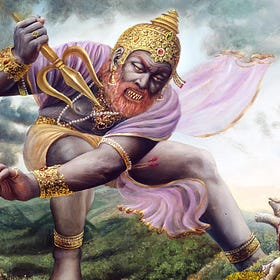Differentiating material opulence from spiritual advancement
We often equate material talents and spiritual advancement. That’s probably one of the greatest mayas of our movement.
Many evangelical Christian groups equate material success with spiritual advancement or eligibility. Since they don’t believe in the law of karma, their belief is that money and other resources are blessings from God. Thus, members who attain more material success are taken as more advanced, or more surrendered to God, the recipients of His mercy. Often, material development is taken as a goal of their spiritual practice, and followers are stimulated to give money to the church, pray, and be involved as ways to get the blessings of God (more money), which in turn proves they are better Christians, feeding the cycle.
Fortunately, we don’t share this misunderstanding. In general, we understand that money and material resources don’t equal spiritual advancement. If anything, we will presume that a rich person is less spiritually active than a devotee who looks more renounced.
However, we have another tendency that is similar in practice and can be equally damaging. What is it?
We often equate material talents and spiritual advancement. That’s probably one of the greatest mayas of our movement, so to say.
Ordinary people tend to worship materially powerful individuals, such as the rich or famous, artists, etc. However, this usually doesn’t bring anything good, as these people are often not very good examples. This comes from a mixture of two things: identification and the desire to be like them. Just like we identify with our own bodies, we may identify with other people, and thus feel happy when we see these people enjoying themselves. From this identification comes a desire to be like them, which leads us to try to be close to and imitate them. That’s why people who are beautiful and materially talented become celebrities on social networks; for example, many want to be like them. Celebrities are respected and even worshiped, becoming authorities and role models.
Understandably, devotees are not free from this propensity. We are also inclined to worship materially powerful people, as well as to create stars out of entertainers. Anyone who has a special talent for singing, acting, cooking, speaking in public, and so on, may become be object of worship. If one can sing very beautifully, this means he or she must be a pure devotee, right? We thus equate such material qualities with spiritual advancement and prematurely elevate people to the position of spiritual authorities and role models.
Some pure devotees were great singers, like Narotama Dasa Thākura, but not all great singers are pure devotees. Similarly, some pure devotees are great public speakers, such as Srila Bhaktisiddhānta Sarasvatī Thākura, but not all great speakers are pure devotees. Many pure devotees were very rich, like Pundarika Vidyānidhi, but no one in the right consciousness would argue that it is a rule that all rich people are pure devotees. Similarly, Maharaja Patraparuda was a very powerful political leader, but not all politicians are devotees. In this way, when we carefully analyze, we see that material qualities have little correlation with one’s level of spiritual advancement. Some advanced devotees show a great deal of material talent, but most appear to be just humble and unassuming people.
Material talents are just skills one gets due to one’s past karma. If we use these talents for Krsna, this can surely help us to advance, but it’s a mistake to equate these talents with spiritual advancement. Material talents are just a tool that we can use. Spiritual advancement can come over time from properly using the tool, but not from the possession of the tool itself.
The test of spiritual advancement is not in measuring the skills we have, but the determination we show in using these skills for Krsna. One may chant very beautifully, but how many hours per day is he or she chanting for Krsna? How keen is one in doing other services that don’t involve an audience? Similarly, one may manage well, but how busy is he or she in using this talent for Krsna? One may speak well, but how tirelessly is one using this talent to spread Krsna Consciousness?
Actually, if we consider it in a strict sense, even the determination one shows in using his talents for Krsna is not a direct measure of advancement, because determination can come from the influence of the mode of passion and operate in connection with the false ego, but still, it is usually a more reliable parameter than the mere possession of material talents.
Anyone may have talents, but only a sincere devotee will be able to use his talents for Krsna incessantly, for many years, without stopping. By acting in this way, one may gradually become advanced, although the talents or even the determination itself are not direct measures of advancement.
Another measurement is to observe how one is able to control one’s senses. Srila Prabhupada mentions that the symptom of one who is advancing in spiritual life is that he or she becomes averse to sense gratification. Therefore, a truly advanced devotee will not just incessantly serve Krsna, but will be very serious in following the principles of spiritual life and avoiding questionable activities.
By observing these two factors in parallel, we may be able to better differentiate real spiritual advancement from mere material opulences due to past karma and gradually learn to find truly spiritually advanced people whom we can take as role models, avoiding the illusion of taking entertainers and talented public speakers as pure devotees.
You can also donate using Buy Me a Coffee, PayPal, Wise, Revolut, or bank transfers. There is a separate page with all the links. This helps me enormously to have time to write instead of doing other things to make a living. Thanks!
Read also:
Indra and Vrtrasura, the tale of the pure devotee and the materialist
The story of Indra and Vrtrasura, narrated in the 6th canto of Srimad Bhagavatam is quite interesting. It describes the fight between a pure devotee and a demon. However, contrary to what one could think by looking at the painting, Vrtrasura is playing the part of the pure devotee, while Indra is playing the part of the demon! How it can be so?



